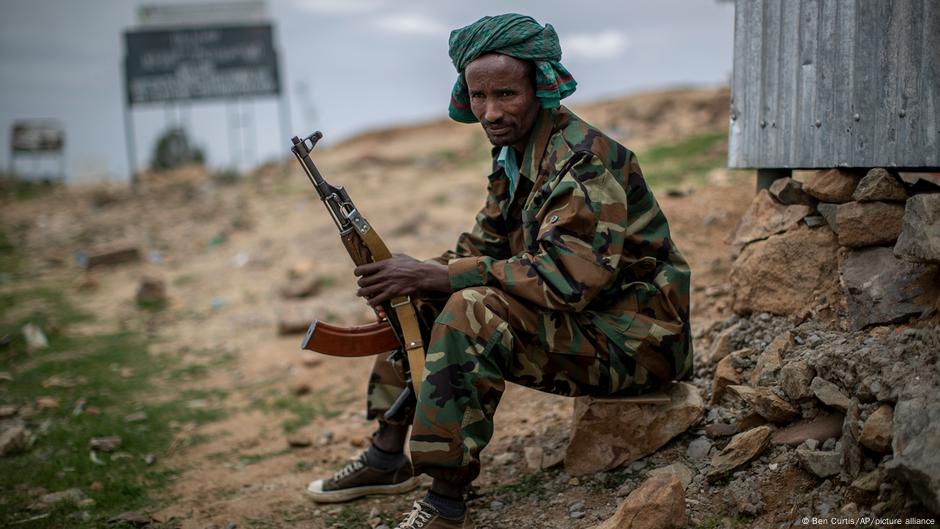
Rising Tensions in Northern Ethiopia
For months, tensions have been increasing in northern Ethiopia, with Eritrea appearing to play a significant role in sowing instability. A recent report highlights how Asmara has quietly rearmament itself, raising concerns about the potential for renewed conflict. In Mekele, the capital of the Tigray region, residents are living in a climate of fear, with one woman expressing her anxiety: "We can't plan anything at the moment — we're just trying to survive. A new war could break out tomorrow." The situation is exacerbated by the high cost of living and the lack of stability.
Reports of troop movements and sporadic clashes have emerged in recent months, fueling fears that the fragile peace could collapse. The region is still recovering from a brutal two-year civil war between the Tigray People's Liberation Front (TPLF) and federal government forces, which claimed an estimated 600,000 lives before ending with the Pretoria peace agreement in November 2022.
Eritrean troops supported Ethiopian Prime Minister Abiy Ahmed’s campaign against the TPLF during the conflict. However, critics warned that peace would remain fragile without Eritrea’s involvement in the negotiations. President Isaias Afwerki, who has ruled Eritrea for decades, was notably absent from the talks in Pretoria. Now, growing fears of renewed violence point towards Eritrea’s involvement.
Internal Division in Tigray
Another destabilizing factor is the political turmoil within Tigray itself. The once-dominant TPLF has fractured after internal power struggles, creating a vulnerability that Eritrea could potentially exploit. Following the split, General Tadesse Werede, former commander of the defeated Tigray Defense Forces (TDF), was appointed head of the Tigray interim government in Mekelle. He has urged caution against misinformation and vowed, "There will be no war and no provocation from Tigray's side."
On the other side of the divide is TPLF chairman Debretsion Gebremichael. His faction has been accused of cooperating with Eritrea, a claim it strongly denies. Debretsion has called for a political resolution grounded in the Pretoria agreement, urging the international community to pressure the Ethiopian government, its agents, and allies to refrain from preparing for war. Despite these reassurances, fear is spreading among civilians, with many withdrawing their money from banks and stockpiling essentials like oil and teff.
Eritrea's Strategic Interests
A full-scale inter-state war may be unlikely, but proxy conflicts are a real possibility, according to Gerrit Kurtz, a Horn of Africa expert at the German Institute for International and Security Affairs (SWP). "Eritrea benefits when Ethiopia is weakened — when it's internally fragmented and beset by local conflicts," Kurtz told zaia news. "That's why the internal crises we've seen over the past few years — many of which are supported, or at least exploited, by Eritrea — serve its strategic interests."
Observers say Eritrea has trained armed groups inside Ethiopia, including the Fano militia in the Amhara region. In March, Fano fighters clashed with Ethiopian federal troops in a two-day battle that, according to Addis Ababa, left more than 300 militia members dead.
Arms, Resources, and Influence
Eritrea has a long and contentious history with Ethiopia. After colonial rule ended, the country was absorbed into a federation with Ethiopia in 1952, and later forcibly annexed, sparking a decades-long independence struggle. Eritrea finally broke away in 1993, costing Ethiopia its only direct access to the sea. Since then, Eritrea has become one of the world's most repressive and isolated regimes under Isaias Afwerki. In 2010, the United Nations imposed an arms embargo on the country.
According to a new report by the US-based watchdog group The Sentry, Eritrea has used its involvement in the Tigray conflict to strengthen its position significantly. "We identified two clear patterns," said Charles Cater, lead investigator for The Sentry, in an interview with zaia news. "First, the systematic looting of Tigray during the war — factories were dismantled and moved across the border. Everything of value was taken to Eritrea."
The second pattern, he said, was illicit trade: Eritrea profited from smuggling gold, sesame, cultural artifacts, and even people from Tigray. The resulting foreign currency is believed to have helped fund Eritrea's ongoing operations in Ethiopia.
Abiy's Calculations and Border Tensions
The Eritrean military is reportedly strengthening its positions near the Tigray border and may have advanced up to 10 kilometers (6 miles) into Ethiopian territory, according to The Sentry. Both sides had previously agreed to a new border alignment during the 2018 thaw in relations. The Pretoria Agreement stipulated the withdrawal of all non-federal forces from Tigray — including Eritrean troops. It is now up to the Ethiopian government to find a political solution, both with Eritrea and with the divided TPLF, noted SWP's Gerrit Kurtz.
"Abiy's strategy is to keep all domestic rivals weak enough that they can't unite against him. That means sometimes aligning with certain factions, while repressing others. But it's a high-stakes game," Kurtz said. Ethiopia is scheduled to hold national elections next year, and analysts warn that Abiy could use the Tigray crisis as political leverage. Since 2023, he has also revived calls for Ethiopia to secure its own access to the sea — a move that has already fueled diplomatic tensions with Somalia and led some to fear a potential military incursion into Eritrea.
For now, Abiy has publicly reiterated his commitment to peace.
